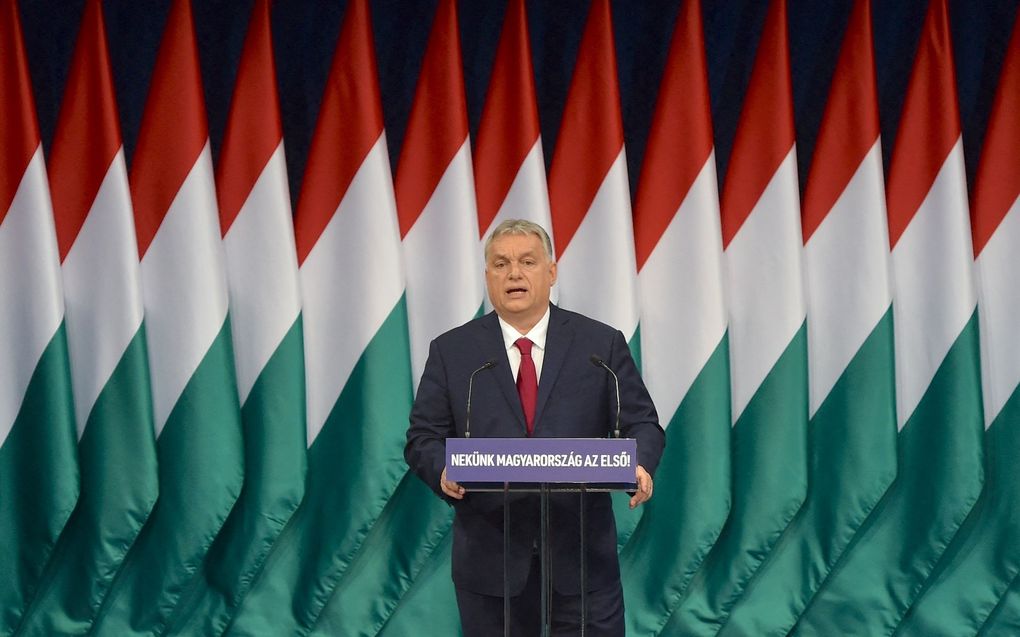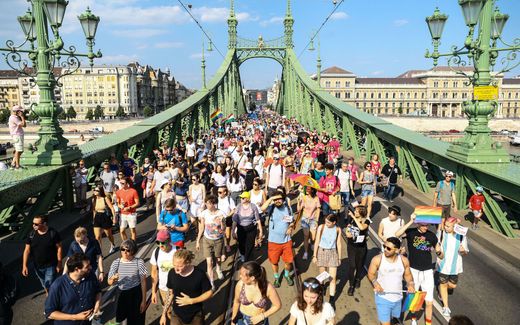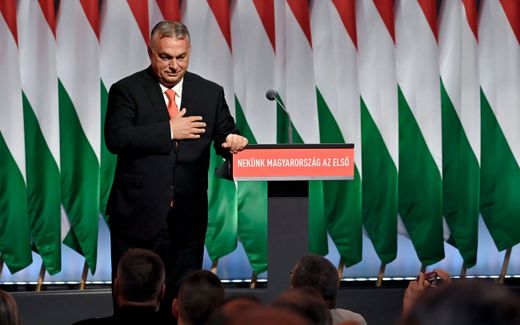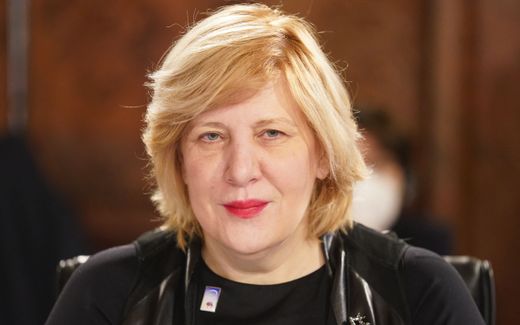For Poland and Hungary, 1945 is not the benchmark for freedom

For Hungarians like Viktor Orban, the national flag is a precious thing. Much more precious than for many other EU citizens. Photo AFP, Attila Kisbenedek
Opinion
And how incredible freedom is! You know it as soon as you lack it. But beware: not everyone has the same benchmark for liberty.
I am Dutch, born and bred in Western Europe. As a teenage boy, I always went to the annual commemoration of the war deaths in the city of Rhenen. There, on a former battlefield, the years from 1940 to 1945 were the point zero for freedom and liberty. I think that is the case for many people in my country and the neighbour countries.
A few years ago, I was reminded of that by reading the German magazine Der Spiegel. A journalist said he walked up a bit with Alexander Gauland, Member of Parliament for the AfD (Alternative für Deutschland, the German right-wing movement).
Evert van Vlastuin (1972) has been working as a journalist from the early 90s.

He has interviewed several Nobel Peace Price winners as the former South African president F. W. de Klerk and two leaders from Northern Ireland, John Hume and David Trimble.
From 2001, he worked as a foreign news reporter for the Dutch Reformed Daily. Since 2021, he works as managing editor for the start-up CNE.news.
A father cycled past with a couple of children, braked and made a U-turn. “Are you Mr Gauland?” he asked. “Frankly, you frighten me.” Scared? “Yes, nationalism means war.”
With these few sentences, much has been said. Behind every German hanging out of the boat on the right, the spectre of World War II looms immediately. After 1945, many of us grew up with this kind of wisdom.
This is certainly understandable in Germany. The Germans feel responsible for the mess of 1945. “Never again”, the leaders thought during the reconstruction. And they then built the European Union.
So, also for the Germans, 1940-’45 (or better: 1933-’45) is the benchmark for freedom. Great Reset. Stunde Null.
A different 20th century
However, the East of the same European Union knows a very different 20th century. For countries like Poland and Hungary, the starting point for (national) freedom is not 1945 but 1990. For the European Union as a whole, this difference in history is a problem.
On the blueprint of this post-war Europe, national borders were marked with dotted lines. Preferably, the ‘walls’ should have been erased. As much as possible, payments are made with one currency. And that the European army remains an ideal that regularly recurs in debates.
Many Western Europeans who celebrate freedom these days have –consciously or unconsciously– the idea that real borders with checkpoints threaten that freedom. In 1945 we were liberated from these borders. Freed from that old-school national thinking.
This is precisely one of the reasons why the EU is often at odds with Israel. That is a state built for the one people, the Jews, who are also determined to defend their borders.
The problem is that the ‘new’ EU member states in Central Europe have a very different sense of freedom. From the Second World War until 1990, they suffered under the pressure of Communism. Indeed, in a country like Hungary, there had traditionally been a strong sense of national pride. But for more than forty years, this was brutally oppressed. Communism was supra-national and meant for the whole world. Socialism was an abstract idea that could not live with concrete countries and borders.
Free to fly the flag
What a liberation it was when Communism disappeared! Countries and peoples were allowed to fly the flag again. Poland flourished, and the Velvet Revolution made it possible for Czechoslovakia to be split up. In this region, freedom meant room for nationalism.
Presumably, no one thought about this when these countries moved towards the EU after 1990. But now it is clear: in Poland, Hungary, the Czech Republic and Slovakia, it is hip to be a patriot. You can argue about whether this leads to good things. Not everybody feels like that. But it is the reality.
For me, as a Dutchman, I have not been brought up with flag-waving. My father even preferred not having a national flag at all. I still remember when we got one first.
But I see that many people and nations in Europe feel the need to express this part of their identity. I don’t share this need that much, but I do understand this need. And sometimes, I value it too.
The question is whether we in Western Europe can deal with this difference. It often strikes me that everyone who does not think about nationality and national borders in the Western European way is given a condemning sticker: populist. Is Hungarian Prime Minister Orban building a solid fence at the border with Serbia (the EU’s external border, no less) to turn away migrants? Populist! And you know, the populist can grow into a demagogue, and the greatest demagogue of all time was Adolf Hitler. Who would want him back? To be honest, all these suggestions go far too much for me.
If elected governments don’t protect the (national and European) borders today, the fascists will do it tomorrow. Border protection is a primary task of any government. That does not mean that there is no room for migrants or asylum seekers. But again, we have to be honest that Hungary and Poland have no tradition or experience there either.
Intention of the Union
After years of criticism from the European Union, I am not surprised that many people in Central Europe experience the EU as a (new) cage. That can never be the intention of the Union.
The least we can do is not use the word populist so easily and listen a little longer instead.
An earlier version of this column was published in Reformatorisch Dagblad on May 4th 2018.
Related Articles








